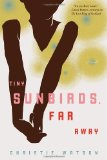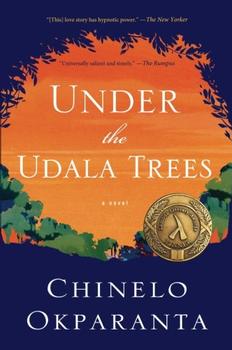Summary | Excerpt | Reading Guide | Reviews | Beyond the book | Read-Alikes | Genres & Themes | Author Bio

Meet Blessing. She has lost her father, and been moved abruptly from her life in the Nigerian city of Lagos to a rural existence she'd never even witnessed before. School is an expensive privilege she hates. Her brother's health issues put his life at risk daily. Her grandparents are very poor, and her mother has a difficult time finding work. As Blessing opens her eyes to this new world around her - frightening and uncomfortable - she also learns to open her eyes to the life she had before, which was not as perfect as she imagined.
Tiny Sunbirds Far Away is equal parts plot and character - I never seemed to reach a good place to stop, so I read it in two days, staying up past my bedtime for "just one more page." What this book does best is put you inside the world of 12-year-old Blessing as that world is turned upside down - in a place where the whole social structure is in upheaval as well, so that personal events mirror society as a whole. The cultural upheaval that comes from the post-colonial presence of foreign oil companies is important to the story, but we see it strictly through its immediate effects on Blessing's life. Interpersonal politics are important here, not governmental policies.
Though the main character is young, Tiny Sunbirds Far Away is not written for young readers. The themes are examined from a mature perspective, though the viewpoint is clearly that of a young girl coming of age. I remember reading this kind of book when I was in high school, so I think mature younger readers will enjoy it, but the primary audience is clearly adults. Events which are confusing to Blessing are clear to adult readers. That distance between what the reader knows and what the character doesn't understand emphasizes the isolation Blessing feels from her family and the world around her.
Female characters dominate, with a realistic range of strong, proud, scared, vain, shallow and intelligent women who ring true while still giving us role models to invest in. Grandma is the star, and becomes the anchor in Blessing's life as she struggles to find something stable. While everyone else is searching for something, Grandma has never let go of the traditions that define her. As a result, it is Grandma who shows Blessing who she wants to be, and keeps the rest of the family from disintegrating. She is not perfect, but she knows who she is, and can tell you who you are if you'd care to listen.
In the end, Blessing discovers that she has to understand her place in her family before she can decide who she wants to be as an individual.
While I didn't find much that was unique or surprising in Tiny Sunbirds Far Away, it is a great example of a coming-of-age novel done right.
![]() This review
first ran in the June 15, 2011
issue of BookBrowse Recommends.
This review
first ran in the June 15, 2011
issue of BookBrowse Recommends.

If you liked Tiny Sunbirds, Far Away, try these:

by Afabwaje Kurian
Published 2025
Set against the backdrop of 1970s Nigeria teetering between post-colonial dependency and self-rule, Before the Mango Ripens examines the enduring themes of faith, disillusionment, and the search for belonging. Both epic and intimate, Afabwaje Kurian's debut announces a brilliant new talent for readers of Imbolo Mbue and Chimamanda Ngozi Adichie.

by Chinelo Okparanta
Published 2016
Inspired by Nigeria's folktales and its war, Under the Udala Trees is a deeply searching, powerful debut about the dangers of living and loving openly.
Harvard is the storehouse of knowledge because the freshmen bring so much in and the graduates take so little out.
Click Here to find out who said this, as well as discovering other famous literary quotes!
Your guide toexceptional books
BookBrowse seeks out and recommends the best in contemporary fiction and nonfiction—books that not only engage and entertain but also deepen our understanding of ourselves and the world around us.